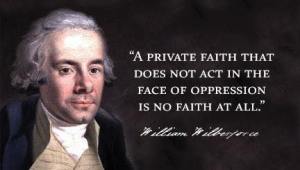“But herein precisely lies the fundamental point of difference between Romanism (Roman Catholicism) and Protestantism. According to the principle of Protestantism, man’s consciousness of self and of objects presuppose for their intelligibility the self-consciousness of God. In asserting this we are not thinking of psychological and temporal priority. We are thinking only of the question as to what is the final reference point in interpretation. The Protestant principle finds this in the self-contained ontological trinity. By his counsel the triune God controls whatsoever comes to pass. If then the human consciousness must, in the nature of the case, always be the proximate starting-point, it remains true that God is always the most basic and therefore the ultimate or final reference point in human interpretation.
This is, in the last analysis, the question as to what are one’s ultimate presuppositions. When man became a sinner he made of himself instead of God the ultimate or final reference point. And it is precisely this presupposition, as it controls without exception all forms of non-Christian philosophy, that must be brought into question. If this presupposition is left unquestioned in any field all the facts and arguments presented to the unbeliever will be made over by him according to his pattern. The sinner has cemented colored glasses to his eyes which he cannot remove. And all is yellow to the jaundiced eye. There can be no intelligible reasoning unless those who reason together understand what they mean by their words.”
Cornelius Van Til, The Defense of the Faith (The Presbyterian and Reformed Publishing Company: Philadelphia, 1955).
Oppression's Request: Keep Your Faith to Yourself
WILBERFORCE, WILLIAM (1759–1833)
English philanthropist; antislavery crusader
Born in Hull, Wilberforce studied in desultory fashion at Cambridge, then in 1780 entered Parliament and became a strong supporter of William Pitt, who persuaded Wilberforce to devote himself to the abolition of the slave trade. In this cause he opposed many in the empire who had powerful vested interests, and he opposed those who regarded slavery as “a natural and scriptural institution.” The reformers finally triumphed in 1807 when the slave trade was done away with, though abolition of slavery itself had to wait until 1833.
Wilberforce, who had been converted at twenty-five, was the most famous figure associated with the Clapham Sect, which sought to do for the upper classes what Wesley had done for the lower. They used their wealth and influence in Christian outreach. He supported missions, fought to improve the condition of the poor and prisoners, and in 1804 helped to form the British and Foreign Bible Society. He also supported Catholic emancipation. Wilberforce, who was once described as “the authorized interpreter of the national conscience,” published in 1797 his Practical View of the Prevailing Religious System, which ran through many editions.
J.D.DOUGLAS
J.D. Douglas, “Wilberforce, William,” ed. J.D. Douglas and Philip W. Comfort, Who’s Who in Christian History (Wheaton, IL: Tyndale House, 1992), 719.
Oppression’s Request: Keep Your Faith to Yourself
WILBERFORCE, WILLIAM (1759–1833)
English philanthropist; antislavery crusader
Born in Hull, Wilberforce studied in desultory fashion at Cambridge, then in 1780 entered Parliament and became a strong supporter of William Pitt, who persuaded Wilberforce to devote himself to the abolition of the slave trade. In this cause he opposed many in the empire who had powerful vested interests, and he opposed those who regarded slavery as “a natural and scriptural institution.” The reformers finally triumphed in 1807 when the slave trade was done away with, though abolition of slavery itself had to wait until 1833.
Wilberforce, who had been converted at twenty-five, was the most famous figure associated with the Clapham Sect, which sought to do for the upper classes what Wesley had done for the lower. They used their wealth and influence in Christian outreach. He supported missions, fought to improve the condition of the poor and prisoners, and in 1804 helped to form the British and Foreign Bible Society. He also supported Catholic emancipation. Wilberforce, who was once described as “the authorized interpreter of the national conscience,” published in 1797 his Practical View of the Prevailing Religious System, which ran through many editions.
J.D.DOUGLAS
J.D. Douglas, “Wilberforce, William,” ed. J.D. Douglas and Philip W. Comfort, Who’s Who in Christian History (Wheaton, IL: Tyndale House, 1992), 719.


